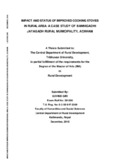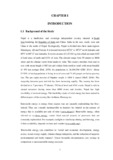Please use this identifier to cite or link to this item:
https://elibrary.tucl.edu.np/handle/123456789/2270| Title: | Impact and Status of Improved Cooking Stoves in Rural Area: A Case Study of Bannigadhi Jayagadh Rural Municipality, Achham |
| Authors: | Giri, Govind |
| Keywords: | Status;Improved Cooking Stoves;Rural Areas |
| Issue Date: | 2017 |
| Publisher: | Central Department of Rural Development |
| Abstract: | Traditional Cooking Stoves used in Nepal are simple structures made from clay or having stone or metal tripods. These stoves are very inefficient because they have poor air flow and insulation. As a result, they consume a lot of biomass and produce high levels of indoor air pollution. So this cooking stove is not useful for cooking. Now Improved Cooking Stove (ICS) is more useful for cooking in rural area of Nepal. Improved cook stoves (ICS) particularly mud-brick ICS with and without chimney is one of the most simple, inexpensive and widely used technologies designed to improve combustion efficiency of biomass and reduce exposure to indoor air pollution. The thesis was carried out in Bannigadhi Jayagadh Rural Municipality Ward No-1, Ganjra of Achham district. The research is primarily focused to discuss and analyze the present situation and impact of Improved Cooking Stoves at research area. The objectives of the study are to discuss the impact, financial requirements & current status of ICS. It has identified health impact on women, senior citizens and children and lastly tries to identify causes of drop out of ICS user of the study area. For the study, the extensive field visit was conducted in Bannigadhi Jayagadh-1, Ganjra of Achham. For the study, Improved Cooking Stoves (ICS) users were selected by purposive method both men and women. It is based on empirical data along with available pertinent secondary data. For primary data household survey and focus group discussion are major study method with questionnaire and checklist tools respectively and the secondary information was collected from previous researches, journals, books, report, publications and related materials of ICS. The study is descriptive and analytical in nature in which descriptive statistic is applied for the analysis of the data. The analysis of the data is done manually, 66 households of the universe were taken as the sample size and random sampling method had been used for this study. The finding of the study has shown that the impact of ICS is effective in the study area. It is an effective technology for the conservation of forest and decrease environmental pollution. Due to this, different projects are launched for the promotion of ICS. From the field survey, out of 334 households, 66 households are taken as sample. It shows that due to the use of ICS; household members, especially women saved nearly 1 hrs. per day compare with traditional cooking stove. The costs and benefits of this technology are most affected by their relative fuel costs, time and fuel use efficiencies, the incidence and cost-of-illness of acute respiratory illness, and the cost of household cooking time. Combining these results with the fact that households often find these technologies to be inconvenient or culturally inappropriate leads us to understand why uptake has been disappointing. Given the current attention to the scale up of ICS, this analysis is timely and important for highlighting some of the challenges for global efforts to promote ICS. The benefits of ICS includes increased thermal efficiency, conservation of forests by reducing fuel wood consumption, reduction in women’s' drudgery, reduction in indoor air pollution and hence smoke-related health disorders, and prevention of fire hazards. So ICS is very helpful to increase socio-economic condition of rural life in our country. |
| URI: | http://elibrary.tucl.edu.np/handle/123456789/2270 |
| Appears in Collections: | Rural Development |
Files in This Item:
| File | Description | Size | Format | |
|---|---|---|---|---|
| Cover Page-5.pdf | 626.98 kB | Adobe PDF |  View/Open | |
| CHAPTER I.pdf | 1.24 MB | Adobe PDF |  View/Open |
Items in DSpace are protected by copyright, with all rights reserved, unless otherwise indicated.
